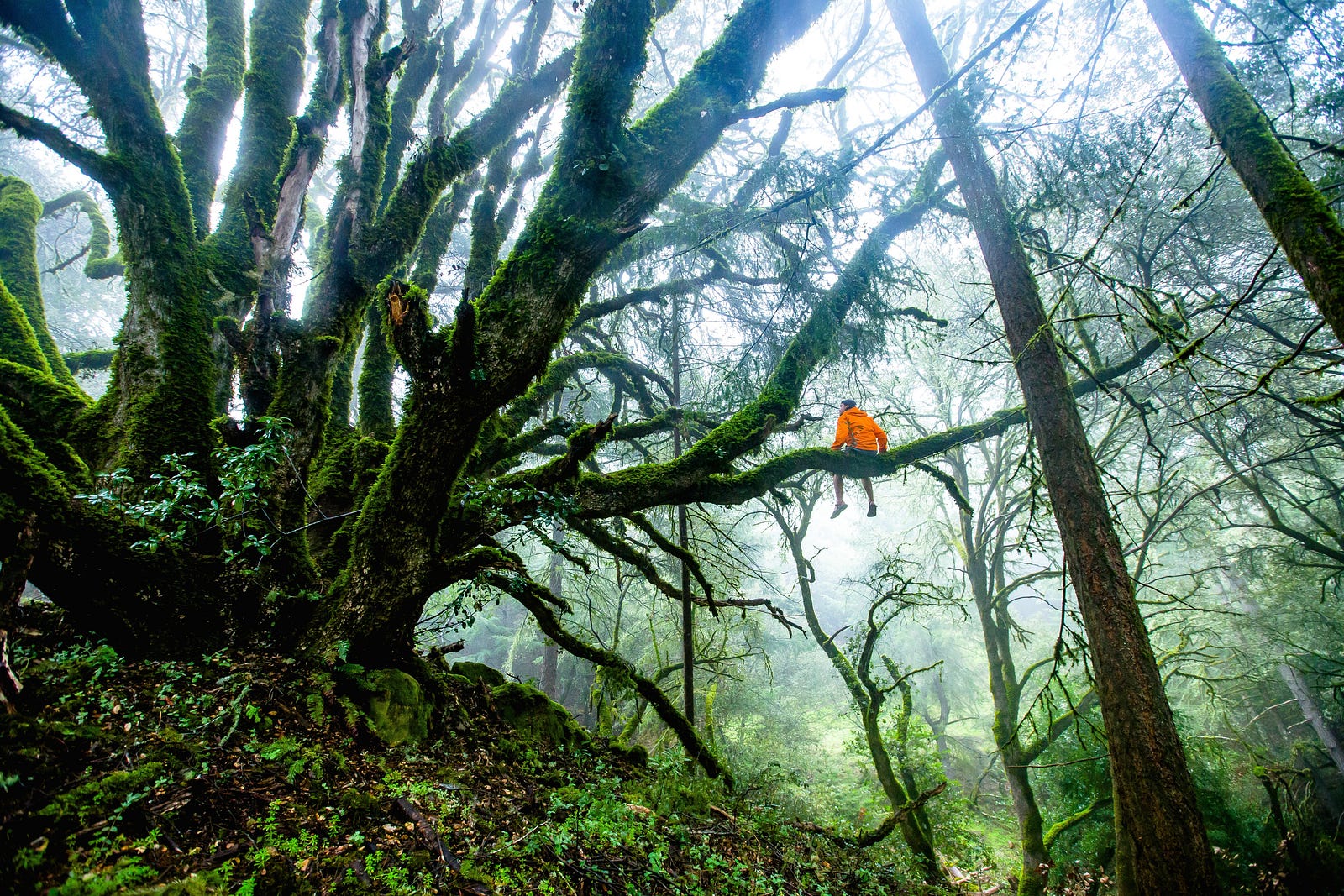
To address climate change we must transform the way we think.
Nowhere is there a need to openly explore our concepts and values more than in relation to the current environmental issues we face collectively. The drastic reduction of biodiversity, accelerating overpopulation, and the marching onslaught of climate change threaten to destroy the planet’s current ecosystem once and for all.
We require a new understanding of reality.
Nothing short of changing our understanding of reality and existence, our way of thinking, and our collective values vis-à-vis the environment are required to avoid extinction of the biosphere as we know it.
Deep Ecology
Deep ecology is an environmental philosophy that argues for a radical change to the way we think of and interact with the environment. Deep ecology asserts the inherent worth of all life irrespective of its instrumental utility in aiding human needs.
Deep ecology posits biospheric egalitarianism, that all forms of life have intrinsic value in their own right, and argues for the restructuring of modern society such that the value of all life forms is respected.
Arne Næss, who coined the term and started the deep ecology movement, viewed the biosphere as a complex set of relationships in which each organism is dependent on the existence of other organisms. Næss argued that human interference in the natural world could only be defended on vital grounds: given the inherent value of each organism as well as the collective value of an interrelated biosphere, non-vital interference or destruction of the environment cannot be justified.
Man in nature, not over nature.
Deep ecology embraces an ethics and social movement based on a holistic vision of the world. It is “deep,” because it attempts to understand the reality of the relationship between human beings and the natural world.
It rejects anthropocentric environmentalism, i.e., conservation of the environment in aid of long-term exploitation for human purposes. And it rejects the Enlightenment narrative of human supremacy: that human beings are separate from and superior to nature.
Deep ecology presents an earth-centered view, and highlights the many indigenous and aboriginal societies around the world that maintain or did maintain a more sustainable and constructive relationship with the environment. It is social and pluralistic insofar as it examines societies and communities in order to understand the many different ways human beings have interacted with the planet. It condemns capitalism for its commoditization of resources and the prioritization of growth and “progress.”
Not Misanthropy
Deep ecology asserts that the damage to the biosphere sustained since the Industrial Revolution threatens collapse of the environment as we know it and the extinction of our species. Based on the primacy of non-interference with the ecosphere, many deep ecologists posit an optimal human population much smaller than it is today.
But deep ecology is not misanthropy: it views human beings as part of the ecosphere and therefore endowed with inherent value. Its posits a long-term and gradual decrease of the population rather than any apocalyptic solution.
Deep ecology supports the following eight principles:
1. The well-being and flourishing of human and non-human life on Earth have value in themselves (synonyms: intrinsic value, inherent worth). These values are independent of the usefulness of the non-human world for human purposes.
2. Richness and diversity of life forms contribute to the realization of these values and are also values in themselves.
3. Humans have no right to reduce this richness and diversity except to satisfy vital needs.
4. The flourishing of human life and cultures is compatible with a substantially smaller population. The flourishing of non-human life requires a smaller human population.
5. Present human interference with the non-human world is excessive, and the situation is rapidly worsening.
6. Policies must therefore be changed. These policies affect basic economic, technological and ideological structures. The resulting state of affairs will be deeply different from the present.
7. The ideological change will be mainly that of appreciating life quality (dwelling in situations of inherent value) rather than adhering to an increasingly higher standard of living. There will be a profound awareness of the difference between bigness and greatness.
8. Those who subscribe to the foregoing points have an obligation directly or indirectly to try to implement the necessary changes.(Deep Ecology: Living as if Nature Mattered).
Activism in the name of protecting the biosphere is condoned only on the basis of Gandhian non-violent means. Environmental terrorism, fascism, and violence are condemned. Deep ecology promotes a flourishing in harmony for all organisms and communities in the biosphere.
Ecosophy
Arne Næss also coined the term ecosophy, or ecophilosophy. Naess explains ecosophy as follows:
“By an ecosophy I mean a philosophy of ecological harmony or equilibrium. A philosophy as a kind of sofia (or) wisdom, is openly normative, it contains both norms, rules, postulates, value priority announcements and hypotheses concerning the state of affairs in our universe. Wisdom is policy wisdom, prescription, not only scientific description and prediction. The details of an ecosophy will show many variations due to significant differences concerning not only the ‘facts’ of pollution, resources, population, etc. but also value priorities.” (The Deep Ecology Movement: An Introductory Anthology)
Næss believed environmental wisdom goes hand-in-hand with the self-realization of all organisms, and the richness of a world flourishing in diversity.

To embrace environmental wisdom is to flourish with nature.
Enter Guattari
In 1989, Felix Guattari put forth his views of what an ecosophy might entail in his book, The Three Ecologies. Guattari rejected a dualistic man vs nature view of reality, but instead posited a monism and pluralism that permeates all of the biosphere.
For Guattari, ecophilosophy is the study of complex phenomena that are heterogeneous and diverse but intimately interconnected. The biosphere is diverse but is informed by a concept of pure difference: assemblages and multiplicities arise in rhizomatic fashion in a process of pure difference.
Three ecologies of mind, society and environment.
Guattari identifies three ecologies that must be addressed in order to arrive at a new understanding of the reality of the ecosphere: the ecology of mind or subjectivity, the ecology of societies, and the ecology of the environment. He asserts that we must change the way we think, the way we socially interact, and the way we relate to the environment, in order to live more in accordance with the reality of our place within the biosphere.
Guattari asserts that environmental problems result from a human subjectivity that in turn is informed by the economic, political, social, and educational aspects of society. He takes a constructivist approach to ecosophy: in order to create a social and political environment that preserves the environment, we must reconstruct our subjectivity and social relations such that human beings come to view themselves as immanently embedded in the environment, not ruling over it or exploiting it.
A new gentleness.
Guattari suggests that in order to change views and beliefs, micropolitical and microsocial practices must deterritorialize old social forms and replace them over time with new singularities and assemblages. And this will involve:
“A new gentleness, together with a new aesthetic and new analytic practices regarding the formation of the unconscious” (The Three Ecologies).
Holistic and Heterogeneous
Næss’ and Guattari’s views on ecosophy dovetail at many junctures. While Næss has a holistic vision of the environment, and Guattari has a heterogeneous vision, both firmly subscribe to a vision of all life having intrinsic value, and an inherent ability for human beings to value the life of other beings. In Næss’ words:
“One can, without hypocrisy, desire something which is for the benefit of other living beings and one normally obtains great, rich satisfaction from it.” (Ecology, Community and Lifestyle: Outline of an Ecosophy).
This ethical stance is the key to self-realization at the biospheric level.
Similarly, Guattari posits the production of a subjectivity that creates assemblages of shared meaning relating to the sustainability of our relationship with the ecosphere that we are all embedded within.

All life has intrinsic value and all life is interrelated.
Applying Deleuze
Deep ecology and ecosophy have much in common with Gilles Deleuze’s philosophy of difference. First and foremost, as a naturalist, Deleuze clearly subscribes to the value of all life, and the affirmation of the forces of life, widely construed as both organic and inorganic.
Deleuze’s starting point is of a reality that is not human-centered, but is instead based on a process of becoming in which humanity is a contingent result. Humanity is valuable, but it is an actuality resulting from a process of becoming, and is but one perspective in an overall vision of change.
Deleuze adopts a continuous view of life and nature, organic and inorganic, that is heterogeneous, decentralized, open and interconnected, but is also driven by a force of creativity that permeates and expresses itself in diversity.
A Deleuzian environmentalism then, would be aimed at the affirmation of evolution and change in the biosphere, and would be opposed to any characterization of the environment objectified on “identitarian” or essentialist terms. It would view the environment as a dynamic process in which all things interact. And it would value only the active forces of life that promote the return of pure difference (in this case natural evolution), and not the reactive forces that would deny life.
A metaphysical view of the environment as pure change, combined with an ethical view of the affirmation of all forms of life, would in turn inform an epistemological naturalism in which consciousness of nature must be transformed such that we come to see ourselves within the same field as everything else in the biosphere.
We must think of nature in nature, and not detached or separated from nature by transcendent reason. If we can do this, then we will grasp that life, widely construed as a process of an open and unfinished whole, must be affirmed. Because:
We are all creative actualizations of the same process.
No Turning Back
Diversity in the ecosystem is the natural result of a process of pure difference. What will always return, what the eternal return will always select, is pure difference. And while the ecosystem will continue to evolve irrespective of how we as human beings relate to it, this is not a license to exploit.
We separate ourselves from our own source of life and creativity when we come to believe ourselves separate and apart from the environmental field, and reduce it to an instrumental resource. Instead, we must remain in the field, and encounter and think nature immanently, and not through the lens of a transcendent hierarchy of thought.
We must nurture our life source and in doing so nurture ourselves.
The return of difference is life itself. Static systems die, evolving systems flourish. If we can begin to see the environment and our place within it as evolving on a plane of immanence, we will flow with the forces of change and continue to participate in the flourishing of nature. If not, we will become extinct.

Climate Change
The promotion of biodiversity is the affirmation of life. But deep ecology and ecosophy subscribe to more than the objective of biodiversity, and the directly related issues of population control and sustainability.
Climate change is an issue that affects the entire biosphere and all forms of life that arise within it. If we can think in terms of process, we will come to see the inherent value and beauty of all things, organic and inorganic. For all things are infused with creativity.
We require an eco-ethic that promotes all of life, including the planet as a whole.
Deep ecology and ecosophy adhere to a subjective, social and environmental vision that affirms the biosphere as a whole. Any non-vital interference with the ability of the biosphere to continue to evolve naturally, including man-made climate change, flies in the face of an eco-ethic that promotes all life.
Climate change is an opportunity, perhaps our greatest.
The challenge of climate change presents us collectively with the opportunity to participate in the immanent deterritorialization of the anthropocentric growth and progress paradigm. Climate change forces us to reconsider our interrelatedness with the ecosystem as a whole. It forces us to understand our immanent relationship with Earth.
Earth is our home in need of nurturing.
A vibrant and mutually revitalizing relationship with our environment, informed by an ecosophy that illuminates and resonates, is not only indispensable to living a life fulfilled: it enhances our ability to do so.
We have this chance now to evolve and become better than we are.
…
Thanks for reading!
Tomas
Please join my email list below.
Excerpt from my forthcoming book, Becoming: A Life of Pure Difference (Gilles Deleuze and the Philosophy of the New) Copyright © 2021 by Tomas Byrne.

Leave a Reply